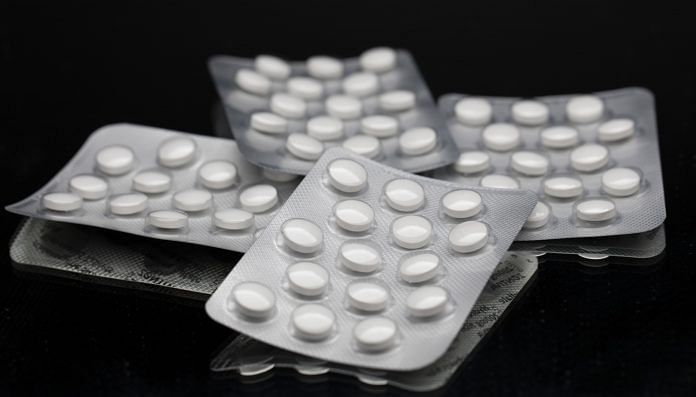
New Delhi: The controversial anti-malarial drug hydroxychloroquine or HCQ could be effective in preventing Covid-19 in patients who have already been exposed to the virus, revealed a pilot study by researchers at the Post Graduate Institute of Medical Education and Research (PGIMER), Chandigarh.
HCQ as part of post-exposure prophylaxis (PEP) — the therapy used to prevent the virus after possible exposure — has the potential to prevent Covid-19 in at-risk individuals, the study, which was published in the International Journal of Antimicrobial Agents on November 6, noted.
The anti-malarial drug has been at the centre of several controversies after it was proved to be effective against SARS-CoV-2 under in-vitro or laboratory conditions, in the initial days of the pandemic.
Despite inconclusive evidence about its effectiveness in clinical trials and possible safety concerns, HCQ was approved to be a part of standard Covid care by several countries. In India, the Indian Council of Medical Research’s ‘Clinical Management Protocol’ advises use of HCQ as an off-label repurposed therapy for treatment.
In October, a pre-print of the multi-trial Solidarity Trial, anchored by the World Health Organization found that HCQ along with three other drugs had no effect on Covid-19 patients.
Researchers at the PGIMER, while emphasising the importance of their study, noted that the “role of HCQ as post exposure prophylaxis (PEP) is still inconclusive and evolving”.
The study
The study was conducted on 317 participants, who had been recruited through the Covid-19 screening from the OPD of the Emergency and Communicable disease ward of PGIMER. Only those who had undertaken international travel in the previous two weeks or come in contact with a person infected with the virus were recruited for the study.
The study, conducted from March to July, was an open label study, which means that both the researcher and the patients were aware of the drug they were being administered.
The 317 participants were sorted in groups of 132 and 185 participants. The first group, referred to as the PEP group, was administered HCQ and the second group of 185 participants was the control group, which wasn’t administered the drug.
The PEP group received two tablets of HCQ 400 mg on the first day and then single tablets weekly for three weeks.
“Both the groups received standard care of therapy in the form of home quarantine for 2 weeks along with social distancing and personal hygiene and followed up for 4 weeks for new onset COVID-19,” the study stated.
The findings
After four weeks, the researchers found that 50 of the 317 participants had contracted Covid. However, only 10.6 per cent of the PEP group tested positive while 19.4 per cent of the participants in the control group were found to be Covid-positive.
“Total absolute risk reduction for the incidence of COVID-19 in participants received PEP with HCQ was -8.8% points as compared to the participants who did not receive PEP with HCQ,” the study noted.
This means that risk of contracting Covid among those taking HCQ after exposure was 8.8 per cent lesser than those who had not been administered the drug.
“Till definitive therapy is available, continuing PEP with HCQ may be considered in suitable at-risk individuals for the prevention of COVID-19, as endorsed by many national/international health authorities,” the study concluded.
The problems
The researchers, however, listed a number of limitations that could have affected the study’s result.
For one, this was an open label study and not the ideal double blind clinical trial where neither the researchers nor the participants know who is being administered what. “Randomization and blinding was not permissible, as HCQ as prophylaxis was recommended for all individuals at risk for Covid-19 by the ICMR,” the researchers reasoned.
They also pointed out that the use of HCQ “is not completely safe, as it can cause life-threatening complication”.
Dr Anupam Prakash, a Professor of Medicine at Lady Hardinge Medical College, highlighted another bias in the study design.
“You don’t know whether a person has really been exposed [to Covid] or not. Suppose, I met a person and that person turns out to be Covid positive, but that doesn’t mean I have had significant exposure. This is an error and bias, which is there always,” he told ThePrint.
Prakash also noted that the researchers had missed mentioning a similar study that had been conducted by researchers of the University of North Carolina in the US, with as many as 821 participants.
Unlike the PGIMER study, however, this study that was published in August had found that the incidence of Covid-19-like illness did not differ significantly between participants receiving hydroxychloroquine and those receiving placebo.
“For a pilot it is good…but we need more studies on this now as the researchers had mentioned,” he added.
Subscribe to our channels on YouTube & Telegram
Why news media is in crisis & How you can fix it
India needs free, fair, non-hyphenated and questioning journalism even more as it faces multiple crises.
But the news media is in a crisis of its own. There have been brutal layoffs and pay-cuts. The best of journalism is shrinking, yielding to crude prime-time spectacle.
ThePrint has the finest young reporters, columnists and editors working for it. Sustaining journalism of this quality needs smart and thinking people like you to pay for it. Whether you live in India or overseas, you can do it here.